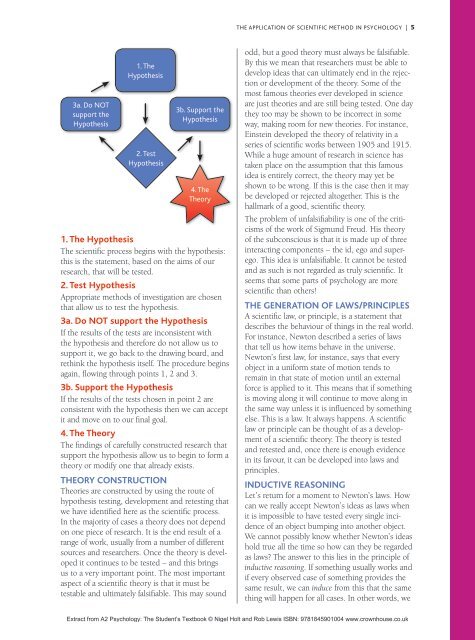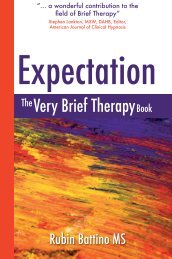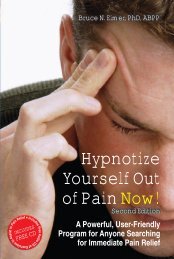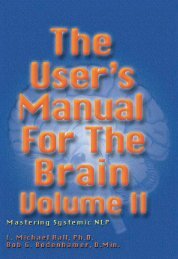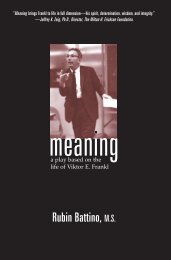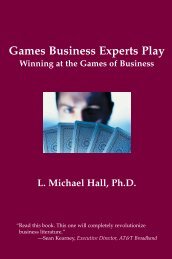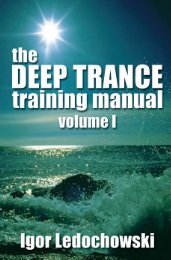Nigel Holt and Rob Lewis - Crown House Publishing.
Nigel Holt and Rob Lewis - Crown House Publishing.
Nigel Holt and Rob Lewis - Crown House Publishing.
You also want an ePaper? Increase the reach of your titles
YUMPU automatically turns print PDFs into web optimized ePapers that Google loves.
the application of scientific mETHOD in PSYCHOLOGY | 53a. Do NOTsupport theHypothesis1. TheHypothesis2. TestHypothesis3b. Support theHypothesis4. TheTheory1. The HypothesisThe scientific process begins with the hypothesis:this is the statement, based on the aims of ourresearch, that will be tested.2. Test HypothesisAppropriate methods of investigation are chosenthat allow us to test the hypothesis.3a. Do NOT support the HypothesisIf the results of the tests are inconsistent withthe hypothesis <strong>and</strong> therefore do not allow us tosupport it, we go back to the drawing board, <strong>and</strong>rethink the hypothesis itself. The procedure beginsagain, flowing through points 1, 2 <strong>and</strong> 3.3b. Support the HypothesisIf the results of the tests chosen in point 2 areconsistent with the hypothesis then we can acceptit <strong>and</strong> move on to our final goal.4. The TheoryThe findings of carefully constructed research thatsupport the hypothesis allow us to begin to form atheory or modify one that already exists.Theory ConstructionTheories are constructed by using the route ofhypothesis testing, development <strong>and</strong> retesting thatwe have identified here as the scientific process.In the majority of cases a theory does not dependon one piece of research. It is the end result of arange of work, usually from a number of differentsources <strong>and</strong> researchers. Once the theory is developedit continues to be tested – <strong>and</strong> this bringsus to a very important point. The most importantaspect of a scientific theory is that it must betestable <strong>and</strong> ultimately falsifiable. This may soundodd, but a good theory must always be falsifiable.By this we mean that researchers must be able todevelop ideas that can ultimately end in the rejectionor development of the theory. Some of themost famous theories ever developed in scienceare just theories <strong>and</strong> are still being tested. One daythey too may be shown to be incorrect in someway, making room for new theories. For instance,Einstein developed the theory of relativity in aseries of scientific works between 1905 <strong>and</strong> 1915.While a huge amount of research in science hastaken place on the assumption that this famousidea is entirely correct, the theory may yet beshown to be wrong. If this is the case then it maybe developed or rejected altogether. This is thehallmark of a good, scientific theory.The problem of unfalsifiability is one of the criticismsof the work of Sigmund Freud. His theoryof the subconscious is that it is made up of threeinteracting components – the id, ego <strong>and</strong> superego.This idea is unfalsifiable. It cannot be tested<strong>and</strong> as such is not regarded as truly scientific. Itseems that some parts of psychology are morescientific than others!The generation of laws/principlesA scientific law, or principle, is a statement thatdescribes the behaviour of things in the real world.For instance, Newton described a series of lawsthat tell us how items behave in the universe.Newton’s first law, for instance, says that everyobject in a uniform state of motion tends toremain in that state of motion until an externalforce is applied to it. This means that if somethingis moving along it will continue to move along inthe same way unless it is influenced by somethingelse. This is a law. It always happens. A scientificlaw or principle can be thought of as a developmentof a scientific theory. The theory is tested<strong>and</strong> retested <strong>and</strong>, once there is enough evidencein its favour, it can be developed into laws <strong>and</strong>principles.Inductive reasoningLet’s return for a moment to Newton’s laws. Howcan we really accept Newton’s ideas as laws whenit is impossible to have tested every single incidenceof an object bumping into another object.We cannot possibly know whether Newton’s ideashold true all the time so how can they be regardedas laws? The answer to this lies in the principle ofinductive reasoning. If something usually works <strong>and</strong>if every observed case of something provides thesame result, we can induce from this that the samething will happen for all cases. In other words, weExtract from A2 Psychology: The Student’s Textbook © <strong>Nigel</strong> <strong>Holt</strong> <strong>and</strong> <strong>Rob</strong> <strong>Lewis</strong> ISBN: 9781845901004 www.crownhouse.co.uk


